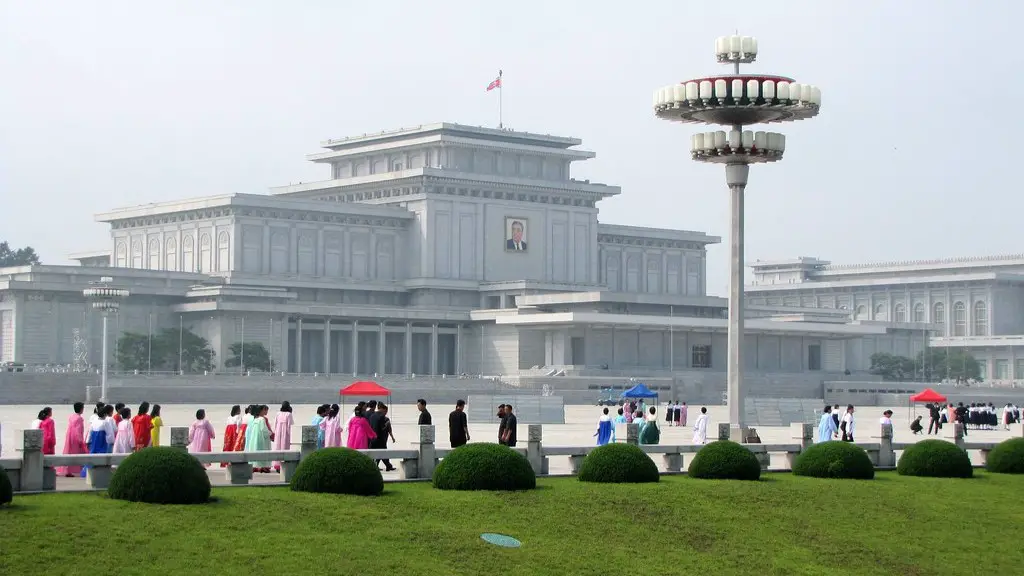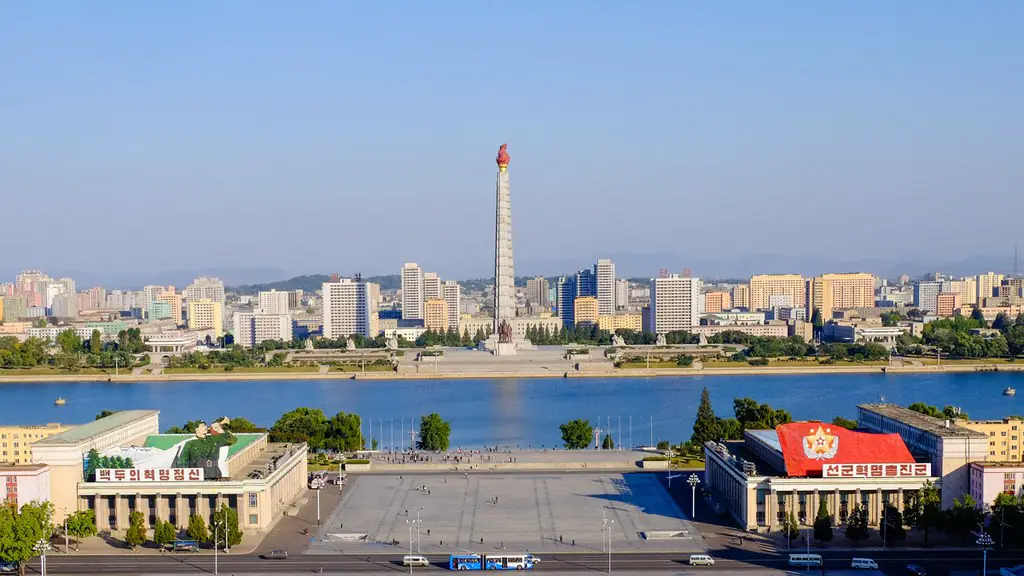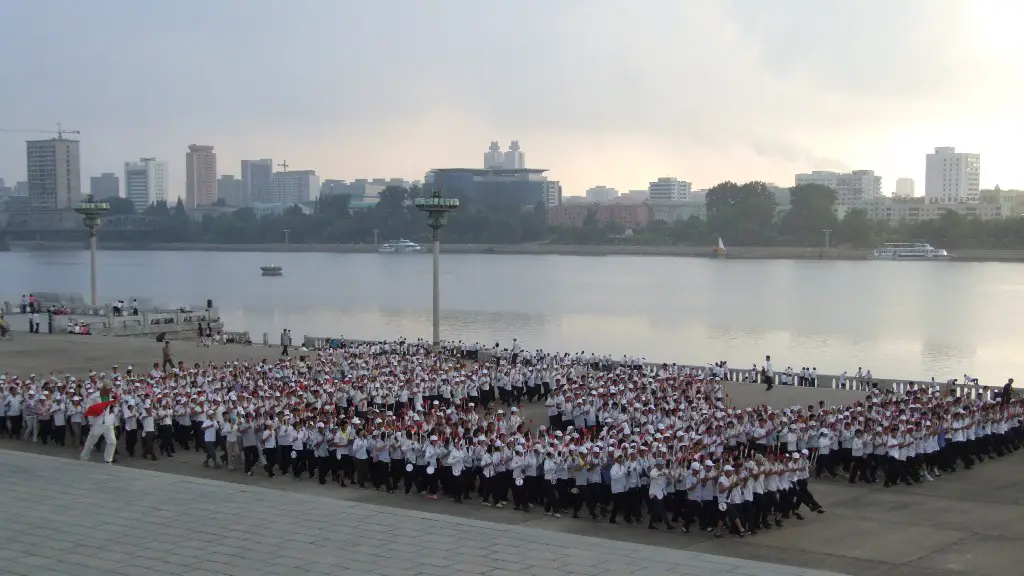Can We Stop North Korea?
It’s no secret that North Korea is one of the world’s most isolated states, with a highly centralised government led by the Kim dynasty. While the hermit kingdom is known for its nuclear weapons program, it is also responsible for a range of conventional missile launches and human rights abuses. Today, North Korea has become a major international security concern, with the US and its allies pursuing a range of diplomatic, economic, and even military options for curtailing the regime’s activities.
International efforts to contain North Korea have been ongoing for decades, with various sanctions imposed and attempts made at securing a peace agreement. Despite these measures, the regime has continued to threaten international security, developing its nuclear and ballistic missile programmes. This has prompted many to ask: “Can the US and its allies actually stop North Korea?”
According to nuclear security and disarmament expert Kingston Reif, the answer is “no”. Reif reckons that, without the support of China, it won’t be possible to deter the North Koreans. China is the regime’s key ally and supplies much of its energy, food and security assurance. Reif also believes that, even if the US and its partners are united in their opposition, further military action by North Korea is inevitable, due to the desire for regime survival and the potency of the North’s nuclear threats.
Security and defence expert John Laine agrees. He believes the best course of action is to secure a lasting peace, via “strict adherence to existing and future limits on North Korea’s capabilities”. This, however, will require mutual commitments by all parties involved. Laine believes the US should be engaging in direct, principled dialogue with the regime, rather than relying on China, as it has in the past.
Of course, the reality is far more complex. The US is currently embroiled in a conflict of interests in the region, as two of its allies – South Korea and Japan – are both seeking different outcomes. As such, the US and its partners in the region must tread carefully, while keeping all their stakeholders satisfied.
Ultimately, the answer is that no one can definitively say if or how the US or its allies can ‘stop’ North Korea. What can be said, however, is that a combination of increased diplomatic engagement and greater financial pressure may be the only way to significantly reduce the likelihood of further trouble from the regime.
Coercive Tactics
The US and its allies have traditionally tried to contain North Korea by way of coercive tactics, such as sanctions and embargoes. They’ve used sanctions to deny the regime access to weapons and technology, as well as financial resources. Coercive tactics have been used globally to encourage countries to abandon nuclear weapons programmes, but North Korea hasn’t budged.
Despite economic difficulties, the regime remains committed to its need for nuclear weapons. In 2017, they conducted their 6th nuclear test – testing various weapons systems that could someday be used in a missile strike. In addition, experts fear the regime could soon develop the capability to miniaturize nuclear warheads, allowing them ratchet up their threat.
Clearly, sanctions and embargoes have not been sufficient deterrents. International pressure has not stopped the Kim regime’s nuclear ambitions. In order to truly contain North Korea’s nuclear programme, more creative measures must be explored. It’s time for the US and its allies to consider diplomatic initiatives.
The Role of Diplomacy
Diplomatic solutions have traditionally been seen as a last resort when it comes to North Korea. While this may be true, diplomatic engagement may yet offer the only viable path forward. As mentioned earlier, both Reif and Laine advocate for increased diplomatic engagement, as opposed to coercive tactics like sanctions and embargoes.
When it comes to diplomatic engagements, there are two primary criteria. The first is continuity; that is, countries must maintain an ongoing dialogue with North Korea – regardless of whether or not it leads to immediate solutions. The second is credibility – the US and its allies must encourage the North Korean government to take them seriously. This means offering real incentives for compliance with international law, such as designation of the regime as a legitimate security partner.
In addition, the US and its allies must take on the role of mediator. There are several factions among the North Korean elite, and it’s essential to identify these divisions and attempt to turn them to their advantage. By understanding the rivalries and interests of various North Korean factions, the US and its allies can exert greater influence over the regime’s behaviour.
By engaging in principled dialogue and attempting to leverage the divisions among North Korea’s leadership, the US and its allies can make strides toward the ultimate goal of curtailing a nuclear-armed North Korea. However, this will require a long-term, consistent diplomatic approach.
North Korea’s Role
It should be noted that, in order for any diplomatic initiatives to be successful, North Korea must be willing to participate. The Kim regime has long been wary of any potential attempts at regime change, and any diplomatic overtures must cater to their insecurities. That being said, North Korea has expressed a willingness to negotiate in the past. For example, the North Korean government recently returned the remains of US service members from the Korean War, and expressed interest in potentially denuclearising the Korean Peninsula.
In addition, the North Korean government has expressed a willingness for increased economic freedom. This could potentially mean a relaxation of oppressive controls on trade and movement, as well as increasing collaboration on humanitarian projects, such as infrastructure and health development- a stark contrast to their current stance on preventing foreign capital.
However, despite these gestures, North Korea remains standoffish and unpredictable. In addition, any negotiations require a certain level of trust, which is difficult to come by in this case. It’s clear that, if the US and its allies are to succeed in containing North Korea, they must take a nuanced, long-term approach.
Regime Change
The idea of regime change has come up multiple times over the past few years, with some suggesting that North Korean leader Kim Jong-un be overthrown by foreign forces. While this is theoretically possible, in practice it’s highly impractical, and the consequences could be disastrous. Any attempts at toppling the regime would require a massive military effort, and there would likely be serious repercussions.
Most likely, there would be a humanitarian crisis, as numerous North Korean citizens would be displaced or killed in the crossfire. In addition, North Korea is supported by China, which has a mutual defense treaty with the regime, meaning any attempt at regime change could easily lead to a regional conflict. It’s also worth noting that regime change is highly unlikely in the near future, due to the lack of political will in the US and other western nations.
Ultimately, regime change is an overly simplistic solution to a complicated and nuanced problem. A more sustainable and achievable solution lies in diplomatic engagement and pressure.
Veto Powers and China
If the US and its allies are to find a solution to the North Korean conflict, they must be able to pressure the regime without relying on China. China has historic ties with North Korea and has been able to block any UN action against the regime. China has the power of veto thanks to its permanent seat at the UN Security Council and it’s clear that, if the US and its allies are to succeed in containing North Korea, they must figure out a way to bypass China’s veto power.
The US has attempted to alienate China from its North Korean ally, by levying sanctions and introducing trade restrictions. For example, the US recently imposed tariffs on Chinese imports in an effort to limit China’s influence. The strategy has had mixed success; while it’s clear that China and North Korea remain strategic partners, the US’s measures have caused some tension between the two countries, resulting in a slight weakening of the bond.
It’s clear that a long-term strategy is needed to force China to reconsider its relationship with North Korea. In the short-term, the US and its allies must continue to pressure China diplomatically, while also offering positive incentives for engagement. In the long-term, the US must pursue deeper ties with China and strengthen the strategic partnership.
Risks and Rewards
The US and its allies must also prepare for the potential risks and rewards of any diplomatic or military action. On one hand, there are the risks of escalation, as any aggressive action by the US or its allies could result in armed conflict with North Korea, potentially leading to a full-scale nuclear war. On the other hand, there are the potential rewards, such as a peaceful and denuclearized Korean Peninsula.
It’s clear that any action taken must be done so carefully and strategically. The US and its allies must prepare for the worst-case scenario, while also ensuring any potential rewards are maximized. To this end, continued diplomatic engagement with North Korea – as well as increased pressure on China – is essential.
It’s clear that the situation in North Korea is complex, and there is no easy solution. The US and its allies must take a multi-faceted approach, leveraging diplomatic dialogue, increased financial pressure, and increased political will to come up with a viable and sustainable solution over the long-term.





